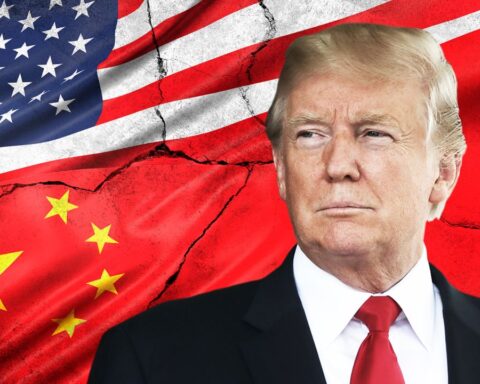As China eases restrictions on cross-border travel, retailers from Hong Kong to Honolulu are preparing to welcome back Chinese tourists after a roughly three-year hiatus.
The return of quarantine-free travel from Jan. 8 will give Chinese travellers a chance to discover a smorgasbord of overseas brands.
“When China reopens, Chinese tourists will be back in Europe and Japan and they will be exploring more local products,” said Alvin Liu, President of Alibaba’s B2C Retail Business Group.
Before the pandemic abruptly cut off international travel, Chinese departures topped 154.6 million in 2019, up from 10.5 million in 2000 according to the World Bank as China’s monied middle class expanded its horizons.
The money at stake is substantial. The value of Chinese outbound tourism spending on shopping in 2019 was $54.7 billion, according to Euromonitor International, a market research provider.
As Chinese tourists return, merchants are exploring how to best meld shoppers’ experience in brick-and-mortar stores with buying digitally; some are turning to the metaverse.
“We are working with our partners to develop a new kind of customer journey that is both online and offline,” said Liu, whose portfolio of businesses at Alibaba includes Tmall Global, China’s largest cross-border online marketplace, where retailers without operations in China can build virtual storefronts and ship products into China.
For one, Alibaba is working with the king of cashmere, Brunello Cucinelli, to future-proof his Italian-headquartered business. By weaving together its digital and physical stores, consumers can discover products and trends online, research the brand and then either buy digitally or go into physical stores to try clothes on and feel the softness of the cashmere.
Import Optimism
Global brands have reason to be optimistic. Demand for international products in the vast Chinese market has continued to grow throughout the pandemic, even with China’s borders virtually closed.
Imports of consumer goods rose nearly 19% to RMB1.73 trillion ($248 billion) in 2021 and gained a further 11.1% year-on-year to RMB1 trillion in the first half of 2022, compared with a slight decline in domestic sales of consumer goods in the same period.
“Chinese customers are becoming more [adventurous] in their preferences. Because China’s population is enormous, even brands that serve a small category overseas have a potentially huge market here,” explained Liu.

China’s consumer e-commerce imports have been buoyed by favorable government policies, including the establishment of comprehensive pilot zones for cross-border e-commerce, through which goods can be imported with lower tariffs and regulatory barriers.
There are now 165 such zones across the country, and the list of products journeying through them continues to expand in response to strong demand from Chinese consumers. Another 29 items, including ski equipment, dishwashers and tomato juice, were added at the start of 2022, taking the list to 1,476 items, including various types of fresh and dry food products, cosmetics, garments, furniture, white goods and electronics.
Recent activity on Alibaba’s cross-border import marketplaces Tmall Global and Kaola – which together account for over 60% of cross-border e-commerce retail sales in China – provides insights into what brands around the world can expect from Chinese consumers in 2023.
Because China’s population is enormous, even brands that serve a small category overseas have a potentially huge market here
– Alvin Liu PRESIDENT OF ALIBABA’S B2C RETAIL BUSINESS GROUP
Liu expects continued growth in specific categories, such as outdoor pursuits and pet care supplies in 2023.
Nearly three years of lockdowns have driven millions of Chinese consumers to explore outdoor activities, including camping, picnics, skiing and fishing.
This, along with the overarching desire for higher-end products, sparked a more than 700% jump in the value of retail imports of skiing equipment, as highlighted in a comprehensive report on China’s consumer imports published by Deloitte and Tmall Global.
Meanwhile, sales of imported pet apparel and accessories jumped 653% in 2021, while sales of toys for cats and dogs were up 457%.
Other top-performing imports include infant formula, up nearly 250% in 2021, along with health care supplements and beauty and personal care products. Within the beauty category, purchases of nail polish and nail care products fared especially well, gaining 281% in 2021.
Global technology brands have also built a strong following among younger Chinese consumers. Wireless headphone purchases soared 825%, while home gaming consoles were up 311%.
International Engagement
With the likes of Alibaba providing a one-stop service for foreign brands to reach Chinese consumers in their homes, the biggest remaining task, according to Liu, is for them to communicate their stories.
“Our partners don’t need to worry about logistics because we handle that through our Cainiao logistics arm and bonded warehouses. The key challenge for them is to build up their brand image and story to reach their target audience in China,” he said.
Consumers in China research the brands and products they purchase more thoroughly than in any other market, according to McKinsey. They are tech-savvy buyers who know how to educate themselves through social media and other online channels.
Livestreaming and short videos have proven especially successful in helping global brands bolster their engagement with Chinese customers. Ahead of the 11.11 Global Shopping Festival, the world’s largest online retail event, real estate investment trust Simon and Shop Premium Outlets, the owner of Woodbury Common, partnered with Alibaba to share over 100,000 outlet products in a two-hour livestream to Chinese consumers.

Liu, who recently returned from a global tour, wants to help more brands tell their stories to the Chinese market. He cites the example of centuries-old wineries in Portugal’s Porto region that are mostly unknown in China.
“We will definitely take advantage of livestreaming and short videos to help these European brands with their content marketing. We can leverage our extensive data about what consumers want to inform them about what works and how to build a sustainable business going forward in China.”
For Liu, this includes exploring new technologies that offer more immersive shopping experiences.
“For example, we are talking with a makeup company that wants to use augmented reality to allow customers to see how their products would look on them. We can also work with partners selling products from shoes to watches to make the customer experience much better,” he said.
Another business within Liu’s purview is the Tmall Luxury Pavilion, which works with the world’s largest luxury houses. British fashion house Burberry leveraged Tmall Luxury Pavilion’s data to create a private digital salon focused on luxury coats.






